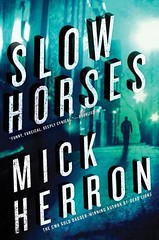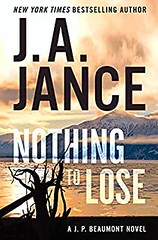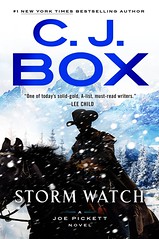 Slow Horses (Slough House #1)
Slow Horses (Slough House #1)
Mick Herron
![]()
Any time a British author writes an espionage novel, comparisons to John le Carré are inevitable, and I won’t disappoint: here’s the start of an outstanding series of espionage thrillers by a new author, convoluted and gripping à la the master, with characters every bit as memorable as le Carré’s.
Espionage thrillers, good ones, are a map of the times: there was a noticeable shift between le Carre’s Cold War novels and those written after the collapse of the USSR; Herron writes of post-7/7 London, another shift. And he’s good: the characters are believable and consistent to themselves, each with a background that’s teased out as we go along; the plot equally believable, as are the insights into MI5’s internal backstabbing politics … remarkable given Herron’s lack of background in England’s security services.
I have to say, the TV adaptation of “Slow Horses,” which began airing on Apple TV in early 2022, is meticulously faithful to the novel, more so than most book-to-TV adaptations I’ve watched. I also watched the Apple TV adaptation of the second novel, “Dead Lions,” and look forward to comparing it with the book, which I plan to read soon … along with the third and fourth novels, “Real Tigers” and “Spook Street.”
 The Devil’s Highway: A True Story
The Devil’s Highway: A True Story
Luis Alberto Urrea
![]()
My book club’s selection for March 2023, “The Devil’s Highway: is the gripping narrative of the Wellton 26, a group of Mexican men who attempted to cross into the United States in May 2001. The men, led by an inexperienced coyote, became lost in the Cabeza Prieta desert area between Sonoyta, Mexico and their intended pick-up point, the Mohawk rest area on Interstate 8 near Wellton, Arizona. Over the course of a multi-day trek in triple-digit heat, 14 men died; the survivors, when found by a U.S. Border Patrol officer, were within hours or even minutes of death themselves.
The death march, described in harrowing detail, provides the drama; Urrea adds layer upon layer of background, digging deep into the reasons the men left their homes in the far south of Mexico for the chance to earn money in the U.S.; how the smuggling cartel that at the time controlled border crossings into Arizona worked; how overlapping U.S. agencies, from the INS to the Border Patrol to national park and tribal police who patrol the border and known smuggling routes; to the rescue agencies that respond to border crossers in trouble, most often from thirst and hyperthermia; to the U.S. and Mexican consular authorities who deal with apprehended border crossers, dead and alive. In short, it’s an education, and even though the way smuggling cartels work has changed since the early 2000s, when the events in this book took place — today the coyotes work for drug cartels and have become even more vicious than the group who led the Wellton 26 into the desert wilderness — the information remains relevant and timely.
Urrea also succeeds in tugging on readers’ hearts, at least mine. I’d like to think even those who dream of a Berlin Wall on our southern border and the mass roundup of undocumented brown men, women, and children will come to understand the forces at play in Mexico and Central America, and the reasons people keep coming north, no matter the hardships and risk involved.
I live in Tucson, and during my motorcycling days rode through most of the major human smuggling areas described in “The Devil’s Highway.” More than once I’ve ridden past Border Patrol agents standing guard over apprehended groups of men and women in desolate areas, waiting for the ubiquitous unmarked white buses to come pick them up. Everything in this book felt timely and immediate to me. I’ve also read some of Charles Bowden’s journalistic nonfiction about the border — Luis Urrea, in his afterword, encourages readers to study Bowden as well. Everything in Urrea’s writing rings true to me, based on what I’ve personally observed and learned about immigration and the border. Highly recommend.
 A Canticle for Leibowitz
A Canticle for Leibowitz
Walter M. Miller Jr.
![]()
I read “A Canticle for Leibowitz” at 14 or 15, shortly after it was published, and have never forgotten the basic outlines of the story. Fifty-plus years later, I began to wonder if this science fiction classic holds up. I won’t keep you in suspense: it does.
I was raised Southern Baptist, taught to distrust Catholicism and Catholics. The lessons must not have taken, because I remember devouring “A Canticle for Leibowitz” and loving it. As the decades went by, whenever I’d see a monk I’d think of this book. What I had forgotten, I began to realize the second time around, is how deeply steeped in Catholicism this novel is, especially the second and third parts.
My fond memory of the brothers who, while unable to understand them, collected and protected technical manuals and blueprints from a destroyed civilization, was a major factor in my decision to re-read “A Canticle for Leibowitz.” I had no memory of the pages and pages of theological debate that characterize much of the novel’s second and third parts, nor of the literal, in-the-flesh presence of The Wandering Jew. Somehow teenaged me got through all that.
Adult me? Much of the later parts of the novel gave me pause, but I persisted, and in spite of my adult disdain for religion devoured the book once again. Was Walter M. Miller Jr. sincere in injecting so much theology into his writing? It’s worth reading the author’s Wikipedia entry, which outlines the reasons for his late-in-life conversion to the Catholic faith.
In my case, while it was more of an effort to digest Miller’s work as an adult, it was worth it. The novel has more than established its place in the science fiction canon, and any serious science fiction devotee should read it. Has it become quaint and dated? A quick glance at today’s headlines suggests not.
 Nothing to Lose (J.P. Beaumont #25)
Nothing to Lose (J.P. Beaumont #25)
J.A. Jance
![]()
I found this novel in our neighborhood tiny library and carried it home for my wife to read. After finishing it, she said I might like it too. It sat on the coffee table until my book club happened to choose it for our May reading & discussion, at which point I picked it up.
I get it: a lot of readers, as indicated by member reviews on Goodreads, love J.P. Beaumont, the protagonist of a series of mystery novels by J.A. Jance. I slavishly follow Joe Pickett and Peter Ash, and am a devoted fan of Jack Reacher (or was, that is, until Lee Child handed the reins over to his brother Andrew). It’s worth noting that I’ve read every one of C.J. Box’s Joe Pickett and Nick Petrie’s Peter Ash novels in sequence (Jack Reacher too, though with him it doesn’t really matter). This J.P. Beaumont novel, my first, is the 25th in the series, so I’ve missed the entire backstory.
The J.P. Beaumont of “Nothing to Lose” is retired and has bad knees, He’s a house husband. His preoccupations are domestic: walking the dog, putting up Christmas decorations, thinking about gifts for his wife, children, and grandchildren. He’s, well … blah.
A missing person case comes his way and he travels to Alaska to solve it, encountering interesting characters and clues, connecting the dots of what turns out to be a murder. Along the way, enough of his backstory emerges that I wish I’d read earlier novels in the series … he must have been far from blah in his heyday. But there’s nothing about the current J.P. Beaumont, most definitely not an action hero, to hook the first-time reader. Devoted fans who’ve followed him from the beginning are, no doubt, well and truly hooked, so first-time readers probably don’t matter much to J.A. Jance’s bottom line.
A thought: Joe Pickett ages as the novels progress. In the latest novel, “Storm Watch,” he’s in his early 50s and definitely not as spry as he used to be, but he can still mix it up a bit. Peter Ash, with only five novels in print, is still in his 20s, with a full life of action yet to live. Jack Reacher must be pushing 70 by now … obviously he never ages in the novels, but what if he did? Would fans still read novels about a man who was once physically invincible but now has to rely on his mind to beat the bad guys? Because that’s what’s going on here with J.P. Beaumont.
I balked at the amount of money J.P. Beaumont spends in this novel. He takes the case on his own dime, the missing person being a son of his former partner, for whose murder J.P partly blames himself. Up in Alaska (to which he flies first class), he throws his moolah around like there’s no tomorrow, leaving his credit card number and PIN with pretty much just anyone he encounters, buying them roundtrip airfare to and from the Lower 48 to boot. How does a cop on a pension, even one married to another cop, get that kind of dough? Answer me that, J.A. Jance!
If you’re a fan, you’ll read it and love it. If you’re new to this series, it’s better you start at the beginning.
 Delta-V (Delta-V #1)
Delta-V (Delta-V #1)
Daniel Suarez
![]()
I was drawn to “Delta-V” by reviews comparing it to the novels of “The Expanse” series. A more accurate comparison is to Andy Weir’s sci-fi novels “The Martian” and “Project Hail Mary,” insofar as the plucky crew of an asteroid-mining spaceship deal with crisis after crisis, but you have to wade through a lot of lead-up to get there.
Pages and entire chapters of “Delta-V” deal with economics and feature a cast of fictional billionaires loosely based on actual figures like Elon Musk, Jeff Bezos, and Richard Branson. There are times Suarez’ writing about financial movers and shakers comes across as worshipful, and you may catch a whiff of Ayn Rand. More than a whiff … at times it’s like being locked in a room with Ms. Rand, who instead of pitching objectivity is trying to get you to invest in bitcoin. When Suarez does a 180 on the rich bastards, showing them for the soulless cheating greedhead scumbags they really are, it’s very far along in the novel, and not very convincing when he does.
Fully a third of the novel is economic background. Another third is prep for the asteroid mining expedition. The last third is the expedition itself, where we finally get to the good stuff: peril, death, narrow escapes. That one-third has the makings of an exciting space opera novel. The other two-thirds would have been dealt with in a few background paragraphs by the authors of “The Expanse,” and Suarez should have followed their example.
One thing still bugs me. In the Ascension Island training camp for astronaut trainees, men and women candidates are subjected to an enforced lack of privacy. They must dress, shower, piss, even shit together. The whole “you’re going to see each other naked and if that bothers you now’s the time to drop out of training” schtick didn’t ring true to me. Especially given that once the trainees leave Ascension, and later still during the ensuing multi-year space venture, lack of privacy never comes up again. Aboard the Konstantine, men and women crew members have separate staterooms and keep their clothes on. So what was Suarez’ point with all that?
 Storm Watch (Joe Pickett #23)
Storm Watch (Joe Pickett #23)
C.J. Box
![]()
To date I’ve read, in order, every Joe Pickett novel. The series, set in a mountainous, sparsely-populated corner of Wyoming, features a state fish & game warden who finds himself and his family threatened by bad men intent on raping the West. Overall, the Pickett books are great reads, engrossing and hard to put down.
This one, the latest in the series, was a bit of a letdown. C.J. Box injects right-wing views into his characters and tends to portray his heroes, the people of the mountain West, as monolithically conservative. While Joe Pickett generally remains apolitical (with a minor slip here and there, as when he makes a nasty crack to a cross-country skier about the “coexist” bumper sticker on her — what else? — Subaru), the storylines constantly highlight C.J. Box’s political inclinations, holding leftists, government officials, and environmentalists up to scorn. Countering this is Nate Romanowski, Joe’s sidekick, naturally distrustful of government and a survivalist by nature, who paradoxically winds up fighting villains who share his worldview. It’s as if Box wants to push the Fox News/MAGA narrative while giving himself wriggle room to disassociate himself from it, putting me in mind of the late Rush Limbaugh, who when called out would always claim he was “just an entertainer.” Which each Box novel, though, it becomes increasingly clear the author listens to a shitload of AM talk radio.
That’s part of the letdown, but so are the bad guys, characterless and cartoonishly evil, incapable of insight or change, the batch in “Storm Watch” more unbelievable than most. I was disappointed in Geronimo, introduced as a new ally of Nate’s in the previous novel, “Shadows Reel,” who in this novel is no longer a street-fighting BLM activist but a hanger-on. A promising (and promised, at least in pre-release publicity for this novel) tie-in with Box’s Cassie Dewell series doesn’t materialize. We learn Joe’s daughter Sheridan goes by “Sherry,” which has me questioning everything I ever thought I knew. The bitcoin mining subplot leads … nowhere. Maybe in the next novel we’ll find out Nate and Geronimo lost their shirts.
I dunno … it feels like C.J. Box was going through the motions with this one. Still highly readable and hard to put down, but not as satisfying as most of the earlier novels in the series.